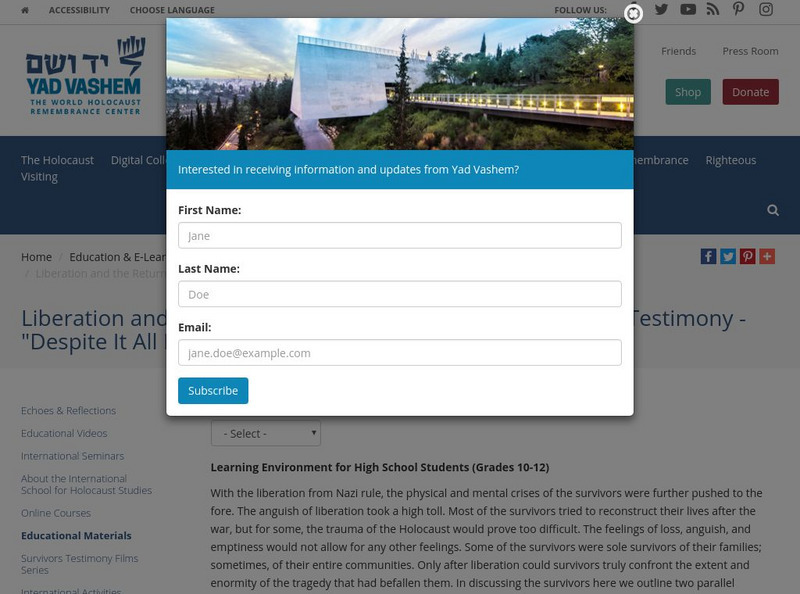Yad Vashem, The World Holocaust Remembrance Center
Yad Vashem: Traces of History: Salonika, Greece
The city of Salonika, Greece was virtually extinguished during WWII. This proud city was a hub of European Jewry with a strong cultural identity. Learn about their culture and what happened to the city during the Holocaust.
Yad Vashem, The World Holocaust Remembrance Center
Yad Vashem: Despite It All I Am Alive
Liberation was not only exciting, it was also heartbreaking and scary for a lot of the Jewish survivors. Many had no home or family to return to. Using this site, learners can click on a picture and learn more about life after...
Yad Vashem, The World Holocaust Remembrance Center
Yad Vashem: Berdichev: One of the Untold Stories
Learn the story of Berdichev, a Jewish community in Soviet controlled Ukraine to better understand the key stages of the Final Solution. The lesson is broken down into different topics each with background and reflective questions.
Yad Vashem, The World Holocaust Remembrance Center
Yad Vashem: Between the Worlds
Using a specific ghetto as an example, read about the lives of children during the Holocaust. Topics include children and their parents, the world of children, and youth leaders. Each topic has background information and a lesson plan.
Yad Vashem, The World Holocaust Remembrance Center
Yad Vashem: To Remember Their Faces
"A picture is worth a thousand words". This saying is relevant to the study of the Holocaust. The six million victims were real people with life stories, not just a number. Students will understand the individuality of each victim by...
Yad Vashem, The World Holocaust Remembrance Center
Yad Vashem: Despite It All, I Am Alive
Liberation was met with excitement, but also sadness and anxiety. Many people had no home or loved ones to return to. This easily navigable slideshow chronicles life after liberation, loneliness, DP camps, and new homes using photographs...
Yad Vashem, The World Holocaust Remembrance Center
Yad Vashem: Teaching About Daily Life in Warsaw
This resource contains materials for a teacher to plan a lesson on the Warsaw Ghetto. Included resources are background information, presentation, photos, and a video. Lesson plans, self-study entries, and additional resources are also...
Yad Vashem, The World Holocaust Remembrance Center
Yad Vashem: Babi Yar
Babi Yar is a ravine that became the site of the mass murder of the Jews in Kiev during the occupation of the Soviet Union. This module gives a historical overview of Kiev, information on the Holocaust, and a summary of post-war days in...
Yad Vashem, The World Holocaust Remembrance Center
Yad Vashem: How Was It Humanly Possible Teaching About the Perpetrators
Teaching about the Holocaust perpetrators is tough. How do you explain the murder of six million men, women, and children? This module tries to help teach this aspect of the Holocaust by providing some insight into the backgrounds and...
Yad Vashem, The World Holocaust Remembrance Center
Yad Vashem: Testimonial Film Series
The stories told by Jewish survivors of the Holocaust are vital to the preservation of memories of this time period. These testimonies can be heartbreaking, but vital to understanding the individual stories of Jewish victims. This module...
Yad Vashem, The World Holocaust Remembrance Center
Yad Vashem: The Bericha
Bericha, meaning escape, became the main goal of survivors after the Holocaust. Many had no home or community to return to. Underground networks helped these displaced people find homes in other countries, many in Israel. Read background...
Yad Vashem, The World Holocaust Remembrance Center
Yad Vashem: Using Photographs to Teach About the Holocaust
Photographs are an excellent way to teach about the horrors of the Holocaust. Using the information on this site, teachers can effectively plan lessons around historic photographs. Included is a video on how to teach using photos from...
Yad Vashem, The World Holocaust Remembrance Center
Yad Vashem: The Final Solution
Teachers can choose from a range of teaching material to present the subject of the Final Solution to students. Materials include lesson plans, archival materials, presentations, testimonies, video lectures, and primary sources.







